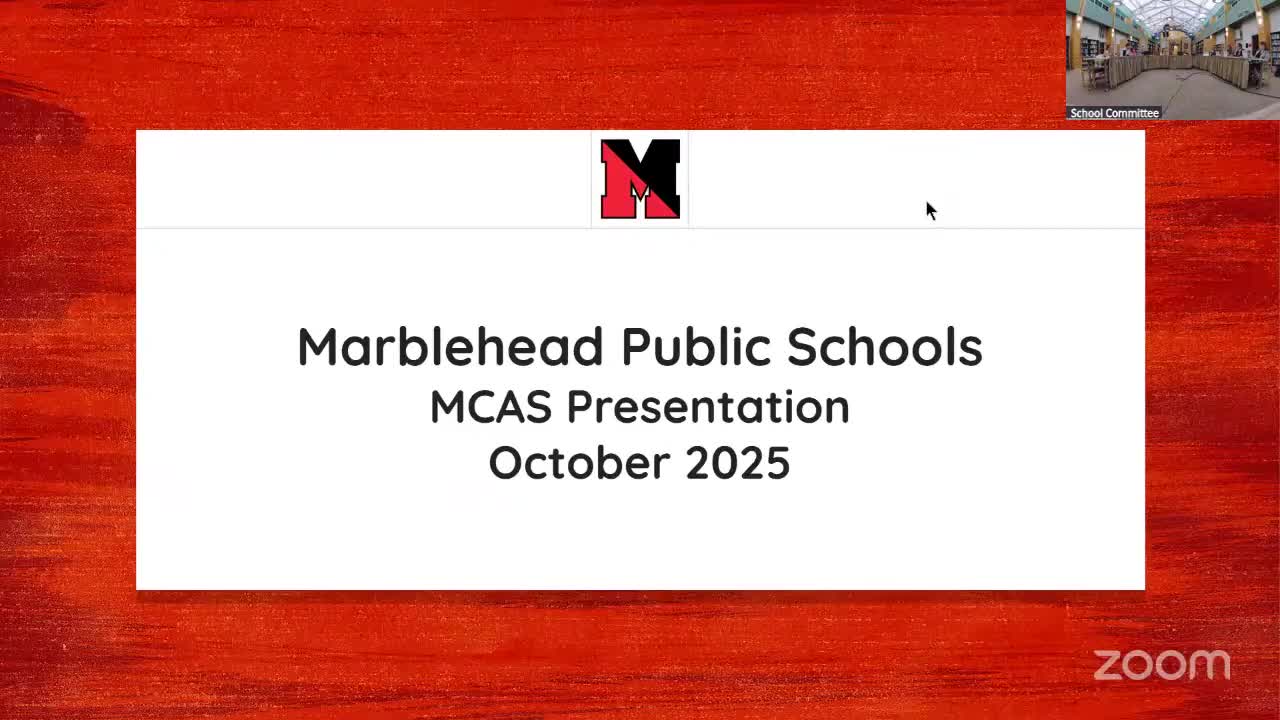Marblehead schools report mixed MCAS results; principals cite attendance and curriculum alignment as priorities
Get AI-powered insights, summaries, and transcripts
Subscribe
Summary
Marblehead — District administrators and building principals presented spring 2025 MCAS results to the Marblehead School Committee, reporting pockets of strong growth in early grades while urging continued attention to attendance and curriculum alignment.
Marblehead — District administrators and building principals presented spring 2025 MCAS results to the Marblehead School Committee, reporting pockets of strong growth in early grades while urging continued attention to attendance and curriculum alignment.
"Growth is an additional statistic to consider when we're looking at MCAS achievement levels," Assistant Superintendent Julia Ferrer said, describing Student Growth Percentiles (SGP) as an important complement to achievement measures. She said Marblehead's district SGP places the district in the "moderate growth" range overall and that selected grade- and school-level cohorts show higher and lower growth patterns.
Principals described several areas of strength. Glover School Principal Frank Kowalski said third grade performance rose from 54% meeting/exceeding in 2022 to 71% in 2025, placing that cohort in the top 13% statewide. Village School Principal Scott Williams called out strong fraction work and writing growth tied to coordinated instructional practices. At Veterans Middle School, Principal Matt Habanji highlighted seventh- and eighth-grade gains, noting "high growth" in specified cohorts.
But speakers flagged concerns, especially at the high school. Marblehead High School Principal Michelle Carlson said some students "have not taken the assessment as seriously as previous years when it was a graduation requirement," and she cited higher absenteeism and reduced testing engagement last year as factors likely contributing to a dip in some high-school results. "MCAS remains a required state assessment," Carlson said, adding there is no opt-out option and the district will continue outreach to improve attendance and test administration engagement.
Assistant Superintendent Lisa Marie Balito reviewed results for students with disabilities, noting grade-by-grade variation: grades 5 and 8 showed higher SGPs (61 and 64), while grades 4 and 10 showed lower SGPs (36 and 40). Balito said the district will analyze which interventions worked in higher-growth grades and expand successful practices to grades showing low growth. She also emphasized absenteeism as a major complicating factor for high-need students.
Ferrer described the district's Student Opportunities Act plan priorities, which include increasing academic achievement for English learners and students with disabilities while supporting social-emotional needs. For English learners the SGPs varied across grades, with some grades showing strong growth.
Principals outlined steps already under way: targeted data-team work, curriculum adjustments, professional learning for writing and math discourse, expanded MTSS/RTI supports, and an enhanced inquiry-based science curriculum. Several principals pointed to school-level professional learning communities and intervention cycles as drivers of improvement.
Officials repeatedly noted MCAS should be used "alongside other assessments," including classroom measures, AP and PSAT scores, DIBELS, and local progress monitoring. Ferrer encouraged families to review the DESE student report and district-provided materials; she said staff would make the slides available via a QR code distributed at the meeting.
The school committee did not take any policy action on testing but asked administrators to continue reporting growth metrics and to present targeted follow-up in future meetings, particularly on attendance interventions at the high school.
Provenance: Presentation and discussion occurred during the MCAS agenda item led by Julia Ferrer and principals; principal remarks and quotations are drawn from the transcript segments beginning 22:17 (Ferrera intro) through the school-level presentations (roughly 46:50–79:00).
